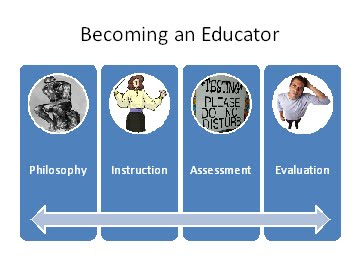Well, we have arrived at the crux of the matter finally, the heart of the academy! I have been thrown into so many educational situations in my life, some of my choosing, others not, that I have worked very hard to find a common core to my teaching experience - something that I can use no matter where I am, no matter how much support or guidance I will have. This is what I have found, this is my foundation!
First of all, I should say this model is all about congruence. We should start with a good understanding of philosophy (sound familiar?), from there move to instruction that is consistent with our philosophic beliefs, then we should use assessment tools that are consistent and sensible given the way we taught, and finally, we should evaluate the results, providing an interpretive light on the whole process. Simple, huh?
I first "felt" this dynamic when it wasn't working, long before I could articulate it however. I am sure we all have. I remember once being encouraged to use Whole Language techniques - wonderful, authentic language tools that fit my philosophic beliefs very well. At the end of the process though, we gave standardized tests as assessments. This incongruence was terrible for me at many levels. My mind did not see the consistency, and I felt the disjuncture as they took the tests. How in the world could the evaluation be positive when the process was so flawed? How could it have worked in the first place?
There are other implications here too, consequences of having to teach in a world with a thousand different theories, techniques, systems, biases, administrators, trends, resources, tools, media, etc. How do you know what fits? One of our main tasks has been and will be to get a good understanding of our philosophy (ontology, axiology, epistemology), then to explore congruent methods of instruction, to administer appropriate assessments when we can, and finally, to critically evaluate the whole process, maybe even our own philosophic beliefs!
When we have accomplished this, we can manage our learning environments choosing the tools and resources best for us. We can understand how to compensate for things that are out of our control too. This will be our task in January, to get through this cycle and identify ourselves in it. There is a lot more to come :)

For me, the above schema (philosophically) has enlightened me more about the "core" of the academy and much more about how to integrate the whole parts effectively. Definitely, becoming an educator is not the utmost aim of the academy rather than scrutinizing and investigating our own philosophy and beliefs about learning and teaching.
ReplyDeleteI enrolled late but now I know where to step forward.
Khaldoon Qaddoomi
:to be or not to be
ReplyDeletethat is the question "
i'm very enthusiastic and having great time . i think its great
Dear Michael,
ReplyDeleteI read an Article about: What makes a good leader?
The Summary is:
''A good leader acts strategically, they craft out a vision and refer constantly to their vision, in their communications and when giving feedback. They are firstly a good manager and they are focused on their people, surrounding themselves with good people.''
Truly I find the above specifications in you.
Bayan.
Wow Bayan, thank you,but it is cheating though! You make leadership so easily, and in turn are a fantastic leader yourself :)
ReplyDeleteI like the way you mingle between mind and heart in this essay and how might feelings and other psychological “drifts” have a great impact on our thinking!
ReplyDeleteAnother point I’d like to make regarding OS is that it can be misleading sometimes and there are other elements that might affect it: students’ moods, tiredness, motivation, time, students’ readiness.. Put it simply: the TS can be more reliable SOME times!
A good book to read in this regard is Genesee’s and Upsher’s CLASSROOM-BASED EVALUATION IN SECOND LANGUAGE EDUCATION
Thank you for that feedback Khadijeh, and the excellent reference!
ReplyDelete